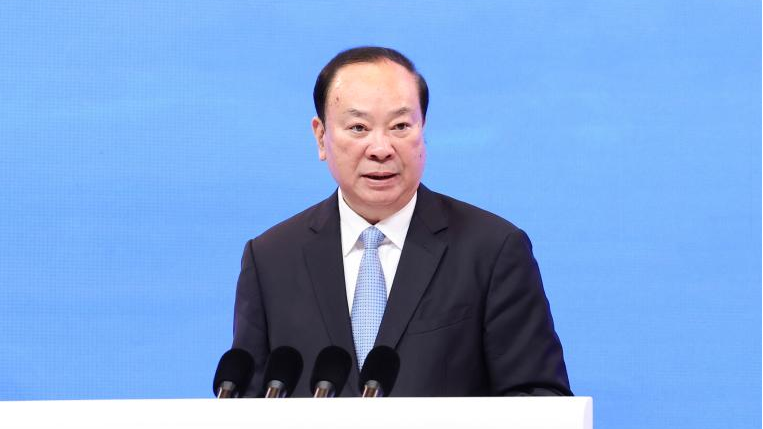
Huang Kunming, a member of the Political Bureau of the Communist Party of China (CPC) Central Committee and head of the Publicity Department of the CPC Central Committee, addresses the inaugural ceremony for the World Internet Conference in Beijing, the capital of China, July 12, 2022. /Xinhua
Huang Kunming, a member of the Political Bureau of the Communist Party of China (CPC) Central Committee and head of the Publicity Department of the CPC Central Committee, addresses the inaugural ceremony for the World Internet Conference in Beijing, the capital of China, July 12, 2022. /Xinhua
Editor's note: Xin Ge is an associate professor at the School of Public Economics and Administration, Shanghai University of Finance and Economics. The article reflects the author's opinions and not necessarily the views of CGTN.
The World Internet Conference (WIC), formerly an annual event held in Wuzhen, east China, dedicated to global Internet governance, became an international organization on July 12 in Beijing. It is now comprised of organizations, companies and individuals from nearly 20 countries.
Chinese President Xi Jinping issued a congratulatory letter for the inauguration of the WIC, stressing its establishment was "an important move echoing the informatization trend of the times, and it will deepen international exchanges and cooperation in cyberspace," and "the future of cyberspace should be jointly built by all countries of the world." The formal establishment of the WIC as an international organization shows China's commitment to promoting prosperity, stability and the development of cyberspace under the guidance of President Xi's vision, said Huang Kunming, head of the Publicity Department of the CPC Central Committee.
In the past decade, the Internet has truly transformed the world into a global village in terms of information and online resource sharing. According to the data revealed by the UN's International Telecommunication Union, the number of global Internet users has reached 4.9 billion in 2021, accounting for over 60 percent of the world's population, a boost of 17 percent since 2019.
For China, the past 10 years have seen its transformation from a follower to a leader in the global informatization movement. Not only has China's digital economy experienced quadruple growth, from 11 trillion yuan ($1.65 trillion) in 2012 to over 45 trillion yuan in 2021, which accounts for 39.8 percent of China's GDP, but also the structure of digital economy continued to be optimized and upgraded due to the industrialization of digital products and services, and digitization of traditional industries.
In the past decade China's development of e-commerce and mobile payment has taken the lead in the world digital economy; in just the past three years, advancements in information aggregation, artificial intelligence analytics and data sharing have been applied to the combat against COVID-19 pandemic and were learnt by and shared with many other countries. By the end of May, China's network facilities had covered all prefecture-level cities with fiber-optic networks with 1.7 million 5G base stations.
In view of the rapid development of the Internet in China and around the world, we cannot help but wonder: in the vast and interconnected cyberspace, should countries be hostile to each other or mutually respectful? Should countries reject or be open to cooperation? Should it be a zero-sum game or a win-win situation?

People visit the Light of Internet expo, part of the the 2021 World Internet Conference Wuzhen Summit, in Wuzhen, Zhejiang Province, east China, September 28, 2021. /Xinhua
People visit the Light of Internet expo, part of the the 2021 World Internet Conference Wuzhen Summit, in Wuzhen, Zhejiang Province, east China, September 28, 2021. /Xinhua
"Countries all over the world should step up communication, broaden consensus and deepen cooperation so as to jointly build a community of shared destiny in cyberspace." President Xi put forward the initiative when addressing the second WIC as early as 2015. Although years have passed, the problems of governing cyberspace have persisted.
First, new problems in cyberspace governance emerge one after another. It is not uncommon that publishing false information, misinterpreting government policies, spreading rumors, spam and vulgar information, and cyber violence occur every day. Notably, "Operation Qinglang," launched by the Cyberspace Administration of China (CAC), has made solid progress throughout 2021, removing over 22 million pieces of improper information. And the CAC has further vowed to crack down on algorithm-induced information cocoons and "algorithmic discrimination" that tech companies use to drive their businesses.
Second, cybersecurity remains the most serious issue in cyberspace governance. A report by Chinese cybersecurity company Qihoo360 released in March 2022 showed that a group of hackers backed by the U.S. government has been attacking the state-level, firm-level and personal-level Internet in China for over a decade. As a result, a large number of netizens' private data, including identities, property, home addresses and even voice messages have been collected, abused or transferred overseas, severely infringing upon the legitimate interests of Chinese people around the world. In February 2022, the National Development and Reform Commission, the Ministry of Industry and Information Technology, the CAC and the National Energy Administration jointly approved a project to build eight national integrated computing hubs with 10 data center clusters across China to facilitate the usage and protection of big data.
Third, cyber hegemony poses a threat to world peace and development. As the world's leading cyber power, the U.S. has long embarked on a three-phase process of establishing, managing and controlling the cyber network, in order to make the rules and gain strategic advantages in cyberspace. Particularly, the U.S. has employed a specialized cyber army to accelerate the militarization of cyberspace since 2010. This army is equipped with the capability to implement the full spectrum of military operations. Moreover, in the name of enhancing its cybersecurity, the U.S. teams up with its Five Eyes allies to run a surveillance program that can oversee 134 countries' intelligence on the Internet.
As President Xi stressed, cyberspace concerns the future of humanity, and therefore entails global efforts. With the Chinese leader's grand vision and step-wise concrete measures taken for cyber development, China is well prepared to work with the international community to make cyberspace a fairer and more equitable, open and inclusive, secure and stable place that can deliver more benefits to people across the world.
(If you want to contribute and have specific expertise, please contact us at opinions@cgtn.com. Follow @thouse_opinions on Twitter to discover the latest commentaries on CGTN Opinion Section.)

